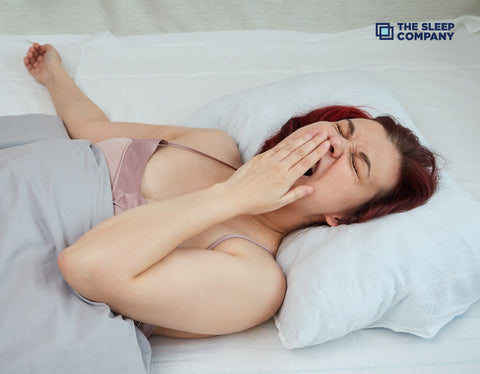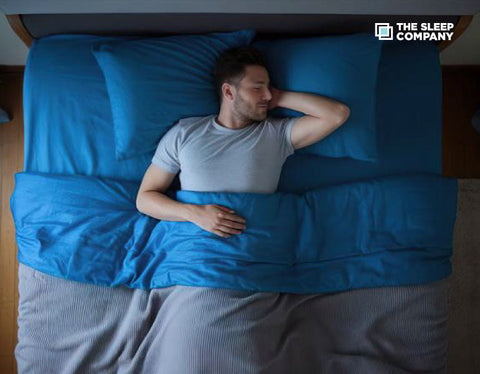My Cart

Different Sleeping Positions and Their Benefit

Whenever a tough situation landed my parents said, “Sleep all your troubles away”. I am sure everyone has once heard that statement during the most stressful days. We all agree that sleep has been and always will be one of the most crucial factors in running our healthy bodies and minds. Sleep positions also declare a lot about someone’s personality, well keeping that in mind many types of research were done. Your sleep routine probably has one thing in common.
You probably have a favourite position for sleeping, regardless of whether you go to bed at various times every night or get up at different times every day. Various sleep positions have various advantages. Let us say that when a person is going through torment or a certain illness, they could have to change the position they sleep in to assist in having a night of disturbed sleep at night.
What’s more, while it probably won’t be something one can do in one evening, choosing an alternative sleep position can be worth taking a chance at. Carving out the opportunity to step by step prepare oneself into various sleeping positions or switching into different positions can help in further developing your rest quality. Now, in the event that that is something you’re not happy with, don’t fret over it.
You can always try and not try something that is unlikely to give you comfort, but that will be unknown until you try. Let us jump into different sleeping positions and how they can help you:
The Fetal Sleeping position
The fetal position includes dozing sideways with legs in a bending manner that curls into your body. It’s the famous sleep position and most adults sleep in this position. In addition to the fact that it is perfect for lower back issues or pregnancy, yet to sleep in the fetal position can likewise assist with reducing the snoring issue most adults or parents go through. Sometimes an uncomfortable mattress could also lead to such sleeping problems.
In any case, the fetal position sleeping has a couple of disadvantages. But can be easily managed by ensuring that the legs have moderately free space to extend, generally, this comfortable position could restrict profound breathing while one takes a nap. Likewise, on the off chance that is generally for one to dislike joint torment or solidness. At the beginning of the day, sleeping in a firm fetal position may result in soreness
Sleeping in the Stomach position
This one is the least preferred position to sleep on a mattress or an adjustable bed. Most experts or doctors do not suggest sleeping in this position after meals. But sometimes I prefer sleeping in this position to reduce snoring or breathing-related issues.
But it comes with the disadvantage of having issues with both neck and back pain are common side effects of sleeping on your stomach. You might also wake up tired and sore as a result of the strain it puts on your muscles and joints. It might help to place a pillow underneath the stomach area in order to relieve back pain.
Sleeping Flat on the back
When one decides to sleep on their back offers the most medical advantages. It safeguards the spine, and it can likewise assist with alleviating hip and knee-related pain or torment.
Sleeping on the back involves gravity to keep the body in an even arrangement over the spine. This can assist with lessening any kind of tension on our back or joints. A cushion behind the knees might assist with supporting the regular bend of the back. In addition, assuming that one’s day can be stressful over maintaining the skin and how it looks. This position protects the skin all over from getting wrinkled or spilled products when a few apply skincare products on the face while resting on the back.
On the other hand, resting on our backs can be hard for people who experience a lot of issues related to snoring. It can likewise be hard for anybody with pain in the back or a previous injury, which is the reason it’s vital to ensure you’re appropriately upheld.
Is it necessary to adjust the sleeping position?

Sleeping positions and their benefits come along and vary from individual to individual. From injuries to age-related body pains, some positions can help a certain group while being painful for another. You don’t need to change anything if you don’t suffer from snoring, breathing issues, acid reflux, or cramps and pains on a regular basis. It is likely that you are already sleeping in a healthy position and doing the right thing to sleep in a certain way already.
During the menstrual cycle or pregnancy, women sleep in different postures and positions to comfort themselves while men do not need them. While athletes can also choose support in the form of a pillow or other materials when they go through injury. A mattress and its comfort can also make or break your sleeping positions so make sure to buy mattress online after doing thorough research.
Then again, on the off chance that you end up awakening habitually with back pain or torment around the neck, it is likely being brought about by the incorrect sleep postures. Make an honest effort to change the positions or correct posture for quality sleep and try not to cause yourself any drawn-out issues. The feeling of the mattress against your stomach while acting like hugging a pillow, which may help people transition from the stomach to the side sleeping easier.
Conclusion
Distress over sleeping positions and waking up to no torment can be achieved by getting a proper mattress and bed that fits your size. The bedroom environment also matters in a lot of cases while position and posture are the real deal.
Sleeping in the wrong posture results in pain or a stiff neck, in regular instances, look for help from experts or adults. Do not experiment with any kind of stunt which can further lead to big damage. Read, Research, and Preach about healthy living and sleeping.





























































